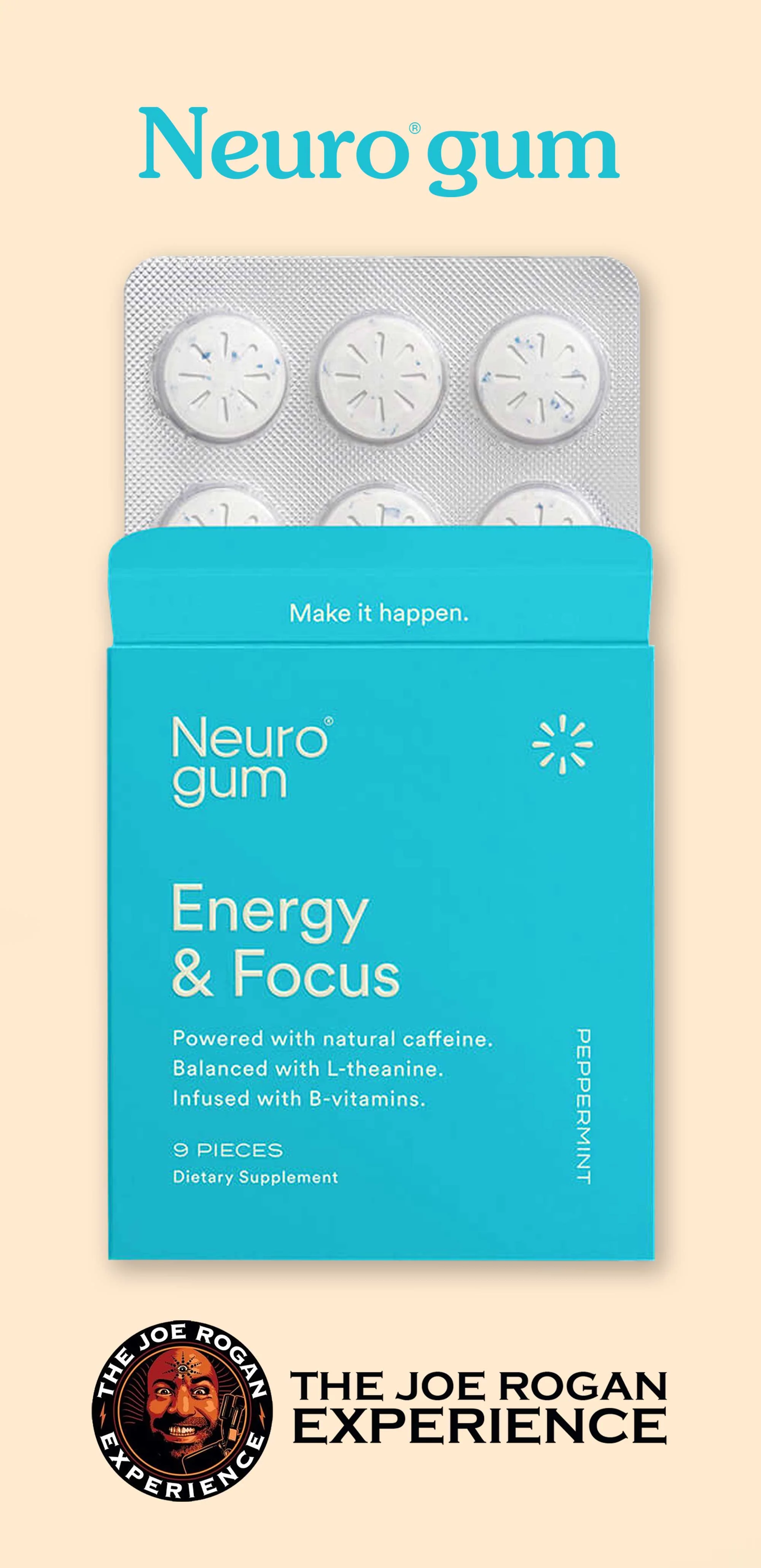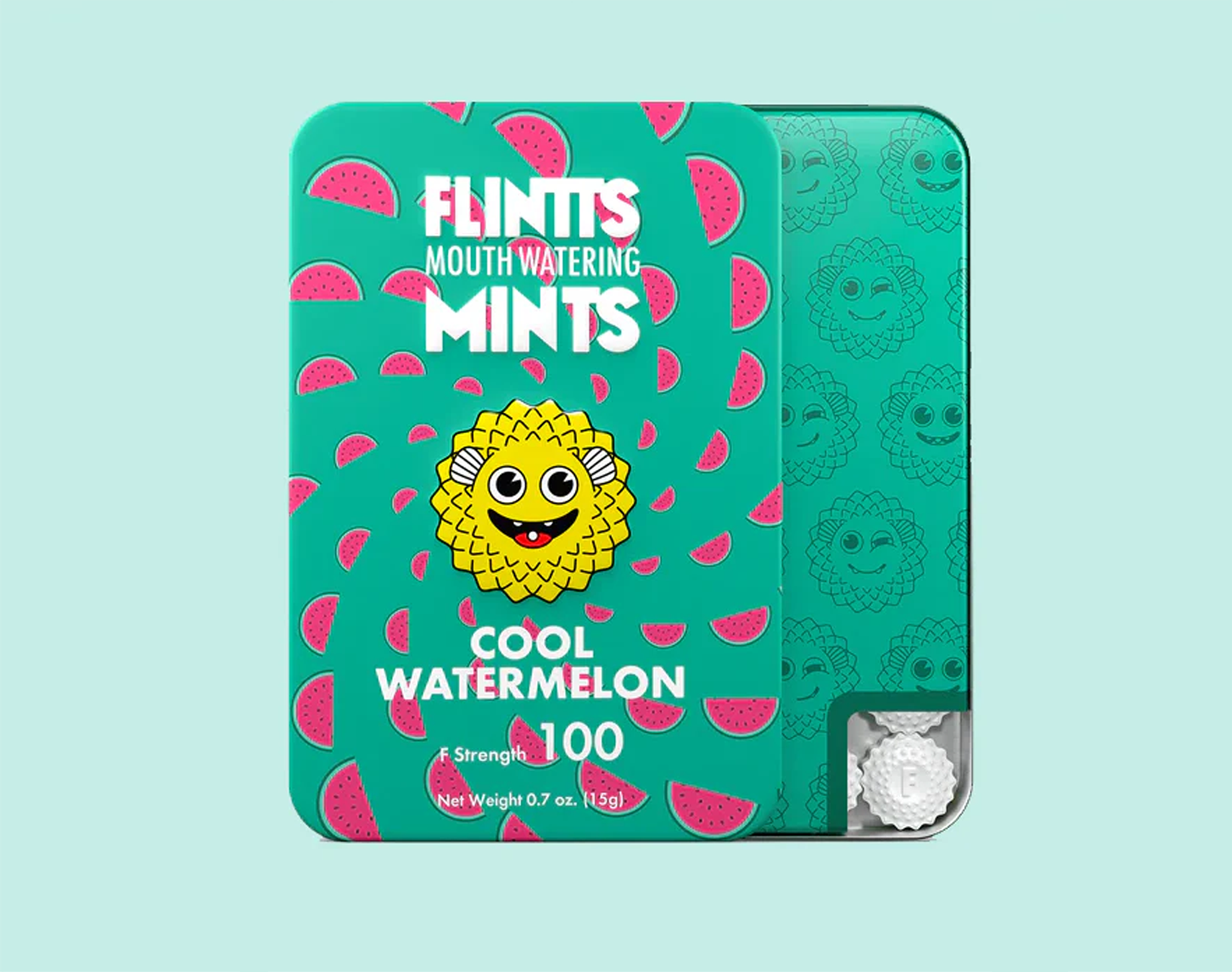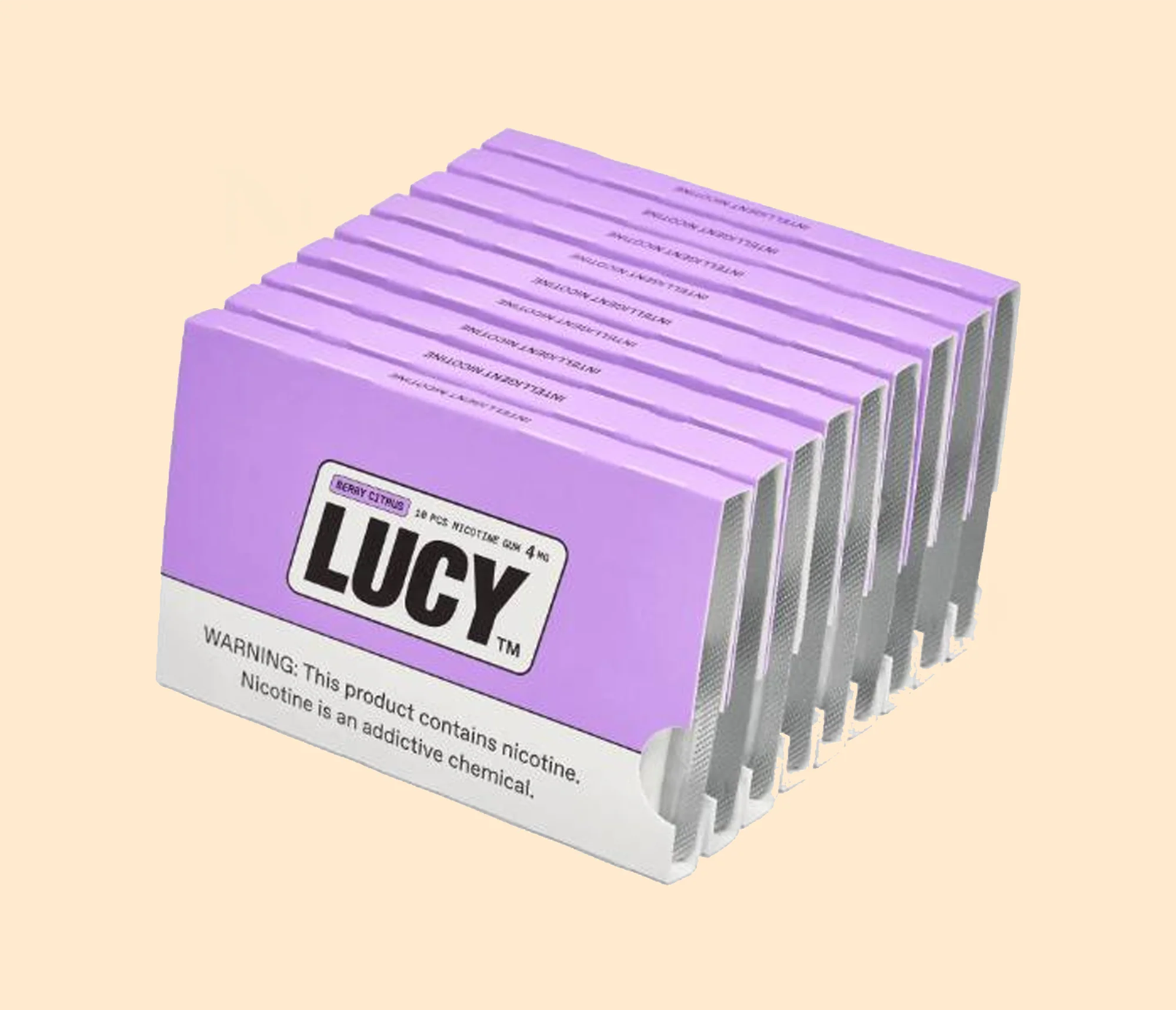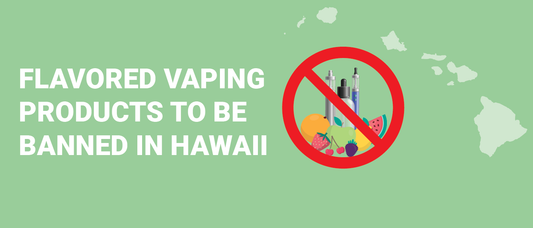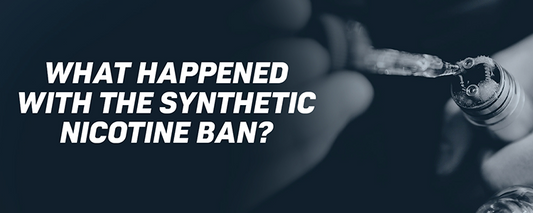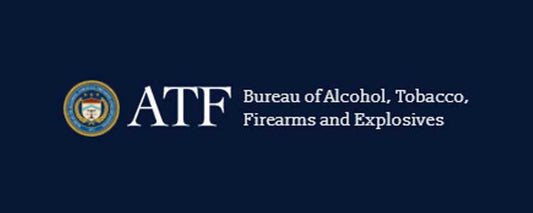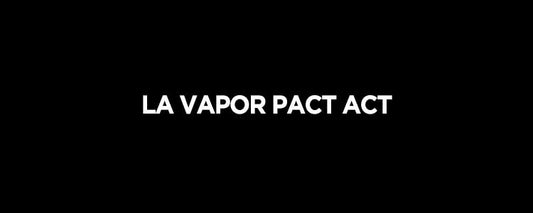Calendar
BLOGS
Hawaii Flavored Vape Ban to be Passed
This past Tuesday, a law, which will ban flavored vape and tobacco products in Hawaii, has just passed the House of Representatives with a vote of 36-15. The revised HB 1507 will move forward to Governor David Ige's desk where it will be signed into law or vetoed. It has already passed through the Senate and Ige's decision will be the final ruling.
Hawaii has a rising epidemic of teen vaping among middle and high school students and this bill is an effort to combat teenage vaping. The ban would prohibit the sale of most flavored tobacco products in Hawaii stores including vapes, cigarettes, cigars, pouches, and lozenges. The primary target are fruit, dessert, and sweet flavored e-cigarettes, but will also include menthol cigarettes and flavored cigars.
An exemption was added to HB 1507 that allows for the sale of products that are FDA approved. So far, this includes NJOY and Vuse vaping products as they are the only major brands authorized by the FDA. Representative Scot Z. Matayoshi is not in favor of the exemption and if the law passes, he will introduce a bill to remove the exemption.
If Governor Ige signs this law, retailers will be penalized for mislabeling products containing nicotine as nicotine-free. Fines will be imposed of $500 for first-time violators and $500-$2,000 for additional offenses.
Although this law is aimed at protecting youth from flavored vapes, it will have catastrophic consequences for Hawaii's legal vaping industry. Vape shop owners have been battling the Hawaii Public Health Institute for years over numerous tobacco ban attempts. Now with the flavored vaping ban passing through the House of Representatives, one vape shop owner has had enough.
Scott Rasak is the Chief Operating Officer of Volcano, a vape shop chain with 16 stores all over Hawaii. As a strong advocate for the tobacco industry, he opposes the flavor ban on vaping products. He claims that HB 1507 is a "step backward for public health and adult access to harm reduction" as it will take away from an "age-verified legal pathway."
Rasak believes it will lead to flavored vape products being sold on the black market, leading to no age verification, making a larger problem with youth access. On the other hand, Matayoshi argues that children won't be able to afford black market products since they have little access to money. Regardless of their opposition, they are both for keeping vapes out of youth's hands.
Despite sharing a common goal, Rasak states that the ban is an "overreach of government in the ability for adult consumers to make their own choices and a failure at the state in enforcing the already 21 and over the law" which already exist for smoking and tobacco products. The industry keeps enforcing laws to protect children but they still get them. Vape shop owners argue that they are following all age guidelines and flavored products are not the issue.
Ultimately, the fate of Hawaii's vaping industry is in the hands of Governor Ige. Public health advocates want to keep flavored vaping products out of schools and are heavily pushing for this law to pass. On the other hand, vape owners will face job loss and bankruptcy. The real loss will be that adult vape smokers will lose their safe alternative to cigarettes. Hopefully, the governor will stand by the vaping community and veto this bill.
If you would like to stop the flavor ban in Hawaii, visit the CASAA website. The Consumer Advocates for Smoke-free Alternatives Association (CASAA) has the latest updates and history of the HB1507 bill. Not only do they provide the current status of the bill, but they also have a form where you can send a letter to the governor to urge him to veto the ban. They provide tips to include in comments, phone calls, and testimonies when protesting this bill. It is a great source to help save flavored vapes in Hawaii!
Hawaii Flavored Vape Ban to be Passed
This past Tuesday, a law, which will ban flavored vape and tobacco products in Hawaii, has just passed the House of Representatives with a vote of 36-15. The revised HB 1507 will move forward to Governor David Ige's desk where it will be signed into law or vetoed. It has already passed through the Senate and Ige's decision will be the final ruling.
Hawaii has a rising epidemic of teen vaping among middle and high school students and this bill is an effort to combat teenage vaping. The ban would prohibit the sale of most flavored tobacco products in Hawaii stores including vapes, cigarettes, cigars, pouches, and lozenges. The primary target are fruit, dessert, and sweet flavored e-cigarettes, but will also include menthol cigarettes and flavored cigars.
An exemption was added to HB 1507 that allows for the sale of products that are FDA approved. So far, this includes NJOY and Vuse vaping products as they are the only major brands authorized by the FDA. Representative Scot Z. Matayoshi is not in favor of the exemption and if the law passes, he will introduce a bill to remove the exemption.
If Governor Ige signs this law, retailers will be penalized for mislabeling products containing nicotine as nicotine-free. Fines will be imposed of $500 for first-time violators and $500-$2,000 for additional offenses.
Although this law is aimed at protecting youth from flavored vapes, it will have catastrophic consequences for Hawaii's legal vaping industry. Vape shop owners have been battling the Hawaii Public Health Institute for years over numerous tobacco ban attempts. Now with the flavored vaping ban passing through the House of Representatives, one vape shop owner has had enough.
Scott Rasak is the Chief Operating Officer of Volcano, a vape shop chain with 16 stores all over Hawaii. As a strong advocate for the tobacco industry, he opposes the flavor ban on vaping products. He claims that HB 1507 is a "step backward for public health and adult access to harm reduction" as it will take away from an "age-verified legal pathway."
Rasak believes it will lead to flavored vape products being sold on the black market, leading to no age verification, making a larger problem with youth access. On the other hand, Matayoshi argues that children won't be able to afford black market products since they have little access to money. Regardless of their opposition, they are both for keeping vapes out of youth's hands.
Despite sharing a common goal, Rasak states that the ban is an "overreach of government in the ability for adult consumers to make their own choices and a failure at the state in enforcing the already 21 and over the law" which already exist for smoking and tobacco products. The industry keeps enforcing laws to protect children but they still get them. Vape shop owners argue that they are following all age guidelines and flavored products are not the issue.
Ultimately, the fate of Hawaii's vaping industry is in the hands of Governor Ige. Public health advocates want to keep flavored vaping products out of schools and are heavily pushing for this law to pass. On the other hand, vape owners will face job loss and bankruptcy. The real loss will be that adult vape smokers will lose their safe alternative to cigarettes. Hopefully, the governor will stand by the vaping community and veto this bill.
If you would like to stop the flavor ban in Hawaii, visit the CASAA website. The Consumer Advocates for Smoke-free Alternatives Association (CASAA) has the latest updates and history of the HB1507 bill. Not only do they provide the current status of the bill, but they also have a form where you can send a letter to the governor to urge him to veto the ban. They provide tips to include in comments, phone calls, and testimonies when protesting this bill. It is a great source to help save flavored vapes in Hawaii!
What is the Synthetic Nicotine Ban?
This past month, the United States government passed the synthetic nicotine ban as part of the 2022 Omnibus Spending Bill. This law allows vaping companies using synthetic nicotine in their products to be regulated by the U.S. Food and Drug Administration.
Now that the bill has passed, it will have large implications for vaping manufacturers, retailers, and distributors. Read this article to learn more about how this bill might affect your business and information on the FDA's requirements.
How Did the Synthetic Nicotine Ban Come to Be?
In January of 2020, the U.S. Food and Drug Administration issued a policy that banned the sale of flavored cartridge-based nicotine pods. Companies were given 30 days to stop manufacturing, distributing, and selling unauthorized flavored cartridges. It focused on prohibiting flavored cartridge-based nicotine pods that appealed to teenage users to hinder the epidemic of youth vaping.
Many vaping businesses began to shut down as they couldn't sell their tobacco-based products on the market no longer. Companies were rebranding, such as Juul, or they were finding innovative ways to stay in the vaping industry, like Puff Bar. Puff Bar found a loophole in this policy that pivoted the rise of synthetic nicotine.
The policy banned the sale of tobacco-based pods, but not products made in a lab that contains nicotine. Puff Bar and other companies claimed that these new products did not contain tobacco as it was made with artificial nicotine. For the past two years, brands created disposable vaping devices that used non-tobacco nicotine.
Sales have been increasing for companies as many smokers love the endless fruity options of flavored vaping products. Despite efforts to prohibit sales from teenagers, vapes are getting into the hands of the youth. Pressure from anti-tobacco groups has sparked the government to close this loophole, hence the de facto synthetic nicotine ban.
What is the Synthetic Nicotine Ban?
The synthetic nicotine ban is part of Biden's 2022 Omnibus Appropriation Act that went into effect on April 14, 2022. Although it is a spending bill, the ban was possible due to an addition of a rider. A rider on a government bill is an added provision or language change that has little connection with the subject. Essentially, it is a way for a legislature to pass controversial provisions that would not pass as a bill on its own.
Lawmakers changed the language of the 2009 Tobacco Control Act and added the term "or containing nicotine from any source" meaning chemically derived nicotine. Any product, including nicotine pouches, lozenges, and vapes, is now controlled by the United States government. This closed the loophole that many companies are using to create and sell synthetic tobacco products. Now, companies are forced to follow the same federal restrictions and requirements as tobacco products.
Once Biden signed the law, manufacturers, retailers, and distributors have 30 days to submit an application, a PMTA, to the FDA. Those who submit applications must get authorization from the FDA within 60 days. If not, the FDA will prohibit tobacco sales of that product on the market. Those who do not comply with the new regulations will be subject to enforcement by the FDA.
Similar to the previous ban pushed by anti-tobacco advocates, the main goal of this law is to combat the rising epidemic of vaping amongst the youth. To do this, the ban will eliminate fruit-flavored synthetic tobacco-derived nicotine products that are not FDA approved to be sold or advertised. Its objective is to stop the appeal of fruit flavors, making vapes less desirable to teenagers. Now, the FDA can regulate all products derived from tobacco plants or made in a lab to the same standards set for all tobacco products.
What are Businesses Required to Complete?
The synthetic nicotine ban will affect many companies and consumers because many flavored nicotine vapes will be prohibited to sell if they are not approved by the FDA. Since all nicotine and synthetic nicotine products will be under the jurisdiction of the U.S. Food and Drug Administration, there will be additional rules and regulations businesses will have to follow.
The first major obligation that comes with the new ban is that all manufacturers, distributors, importers, and retailers of tobacco products, including synthetic nicotine, must comply with the Federal Food, Drug, and Cosmetic Act. The FD&C Act initially gave the FDA authority to control the safety of food, drugs, medical devices, and cosmetics. The FDA is now requiring three main requirements for vape businesses.
-One cannot sell these types of products, non-tobacco nicotine, to people under 21 either in-person or online.
-One cannot market these products as modified risk tobacco products without the authorization of the FDA.
-One cannot distribute free samples of these products.
Additionally, the FDA is requiring owners and operators of NTN products to register with the FDA and list all tobacco products manufactured, prepared, compounded, or processed for commercial distribution. More information on this condition can be found on the FDA's website.
Lastly, manufacturers of tobacco and NTN products must submit a Premarket Application (PMTA) for any new tobacco product that wants an FDA marketing order. The PMTA will require scientific data to ultimately decide if a product is safe for the public's health. To reach a conclusion, the FDA will evaluate the risks, benefits, usage, and influence of a product on the smoking and non-smoking population.
The deadline for tobacco companies to submit a PMTA for existing synthetic nicotine products is May 14, 2022. If one is submitting or mailing a hard copy, it must be received by the FDA no later than 4:00 p.m. EDT on Friday, May 13, 2022. All new products will need to submit a PMTA. If a manufacturer has already received a Marketing Denial Order (MDO) from the FDA on a previous application, they cannot submit a new PMTA.
Once all applications are submitted, applicants must receive authorization from the FDA within 60 days. If authorization is not given, all synthetic nicotine merchandise must be removed from the market or will be subjected to enforcement from the FDA. For more information regarding PMTA and the process, visit the FDA's website.
What is the Synthetic Nicotine Ban?
This past month, the United States government passed the synthetic nicotine ban as part of the 2022 Omnibus Spending Bill. This law allows vaping companies using synthetic nicotine in their products to be regulated by the U.S. Food and Drug Administration.
Now that the bill has passed, it will have large implications for vaping manufacturers, retailers, and distributors. Read this article to learn more about how this bill might affect your business and information on the FDA's requirements.
How Did the Synthetic Nicotine Ban Come to Be?
In January of 2020, the U.S. Food and Drug Administration issued a policy that banned the sale of flavored cartridge-based nicotine pods. Companies were given 30 days to stop manufacturing, distributing, and selling unauthorized flavored cartridges. It focused on prohibiting flavored cartridge-based nicotine pods that appealed to teenage users to hinder the epidemic of youth vaping.
Many vaping businesses began to shut down as they couldn't sell their tobacco-based products on the market no longer. Companies were rebranding, such as Juul, or they were finding innovative ways to stay in the vaping industry, like Puff Bar. Puff Bar found a loophole in this policy that pivoted the rise of synthetic nicotine.
The policy banned the sale of tobacco-based pods, but not products made in a lab that contains nicotine. Puff Bar and other companies claimed that these new products did not contain tobacco as it was made with artificial nicotine. For the past two years, brands created disposable vaping devices that used non-tobacco nicotine.
Sales have been increasing for companies as many smokers love the endless fruity options of flavored vaping products. Despite efforts to prohibit sales from teenagers, vapes are getting into the hands of the youth. Pressure from anti-tobacco groups has sparked the government to close this loophole, hence the de facto synthetic nicotine ban.
What is the Synthetic Nicotine Ban?
The synthetic nicotine ban is part of Biden's 2022 Omnibus Appropriation Act that went into effect on April 14, 2022. Although it is a spending bill, the ban was possible due to an addition of a rider. A rider on a government bill is an added provision or language change that has little connection with the subject. Essentially, it is a way for a legislature to pass controversial provisions that would not pass as a bill on its own.
Lawmakers changed the language of the 2009 Tobacco Control Act and added the term "or containing nicotine from any source" meaning chemically derived nicotine. Any product, including nicotine pouches, lozenges, and vapes, is now controlled by the United States government. This closed the loophole that many companies are using to create and sell synthetic tobacco products. Now, companies are forced to follow the same federal restrictions and requirements as tobacco products.
Once Biden signed the law, manufacturers, retailers, and distributors have 30 days to submit an application, a PMTA, to the FDA. Those who submit applications must get authorization from the FDA within 60 days. If not, the FDA will prohibit tobacco sales of that product on the market. Those who do not comply with the new regulations will be subject to enforcement by the FDA.
Similar to the previous ban pushed by anti-tobacco advocates, the main goal of this law is to combat the rising epidemic of vaping amongst the youth. To do this, the ban will eliminate fruit-flavored synthetic tobacco-derived nicotine products that are not FDA approved to be sold or advertised. Its objective is to stop the appeal of fruit flavors, making vapes less desirable to teenagers. Now, the FDA can regulate all products derived from tobacco plants or made in a lab to the same standards set for all tobacco products.
What are Businesses Required to Complete?
The synthetic nicotine ban will affect many companies and consumers because many flavored nicotine vapes will be prohibited to sell if they are not approved by the FDA. Since all nicotine and synthetic nicotine products will be under the jurisdiction of the U.S. Food and Drug Administration, there will be additional rules and regulations businesses will have to follow.
The first major obligation that comes with the new ban is that all manufacturers, distributors, importers, and retailers of tobacco products, including synthetic nicotine, must comply with the Federal Food, Drug, and Cosmetic Act. The FD&C Act initially gave the FDA authority to control the safety of food, drugs, medical devices, and cosmetics. The FDA is now requiring three main requirements for vape businesses.
-One cannot sell these types of products, non-tobacco nicotine, to people under 21 either in-person or online.
-One cannot market these products as modified risk tobacco products without the authorization of the FDA.
-One cannot distribute free samples of these products.
Additionally, the FDA is requiring owners and operators of NTN products to register with the FDA and list all tobacco products manufactured, prepared, compounded, or processed for commercial distribution. More information on this condition can be found on the FDA's website.
Lastly, manufacturers of tobacco and NTN products must submit a Premarket Application (PMTA) for any new tobacco product that wants an FDA marketing order. The PMTA will require scientific data to ultimately decide if a product is safe for the public's health. To reach a conclusion, the FDA will evaluate the risks, benefits, usage, and influence of a product on the smoking and non-smoking population.
The deadline for tobacco companies to submit a PMTA for existing synthetic nicotine products is May 14, 2022. If one is submitting or mailing a hard copy, it must be received by the FDA no later than 4:00 p.m. EDT on Friday, May 13, 2022. All new products will need to submit a PMTA. If a manufacturer has already received a Marketing Denial Order (MDO) from the FDA on a previous application, they cannot submit a new PMTA.
Once all applications are submitted, applicants must receive authorization from the FDA within 60 days. If authorization is not given, all synthetic nicotine merchandise must be removed from the market or will be subjected to enforcement from the FDA. For more information regarding PMTA and the process, visit the FDA's website.
Prevent All Cigarette Trafficking Act (PACT)
Amends the Jenkins Act (15 U.S.C. 375-378) and CCTA (18 U.S.C. 2341-2346)
The Prevent All Cigarette Trafficking Act (PACT) that went into effect on June 29, 2010. The PACT Act features several major components: it regulates the mailing of cigarettes and smokeless tobacco products to consumers through the U.S. Postal Service; adds new requirements for registration, reporting, delivery, and recordkeeping, including a List of Unregistered or Non-Compliant Delivery Sellers; increases penalties to a felony up to 3 years imprisonment; and gives ATF inspection authority to examine any records required to be maintained and any cigarettes or smokeless tobacco kept on the premises.
Who Has to Register with ATF?
Any person who sells, transfers, or ships for profit of cigarettes or smokeless tobacco in interstate commerce, whereby such cigarettes or smokeless tobacco are into a state, locality, or Indian country of an Indian tribe taxing sale or use of cigarettes or smokeless tobacco or who advertise or offer's cigarettes or smokeless tobacco for sale, transfer or shipment.
Definitions
- Common Carrier - Any person (other than a local messenger service or the United States Postal Service) that holds itself out to the general public as a provider for hire of the transportation by water, land, or air merchandise between a port or place and a port or place in the United States.
- Consumer - Any person that purchases cigarettes or smokeless tobacco.
- Delivery Sale - Any sale of cigarettes or smokeless tobacco to a consumer if the consumer submits the order for the sale by means of a telephone or other method of voice transmission, the mails, or the internet or other online service, or the seller is otherwise not in the physical presence of the buyer when the request for purchase or order is made. Or the cigarettes or smokeless tobacco are delivered to the buyer by common carrier, private delivery service, or other method of remote delivery, or the seller is not in the physical presence of the buyer when the buyer obtains possession of the cigarettes or smokeless tobacco.
- Delivery Seller - A person who makes a delivery sale.
- Interstate Commerce - Commerce between a State and any place outside the state, commerce between a state and any Indian country in the state, or commerce between points in the same state but through any place outside the state or through any Indian country.
- Tobacco Tax Administrator - The state, local, or tribal official duly authorized to collect the tobacco tax or administer the tax law of a state, locality, or tribe, respectively.
Prevent All Cigarette Trafficking Act (PACT)
Amends the Jenkins Act (15 U.S.C. 375-378) and CCTA (18 U.S.C. 2341-2346)
The Prevent All Cigarette Trafficking Act (PACT) that went into effect on June 29, 2010. The PACT Act features several major components: it regulates the mailing of cigarettes and smokeless tobacco products to consumers through the U.S. Postal Service; adds new requirements for registration, reporting, delivery, and recordkeeping, including a List of Unregistered or Non-Compliant Delivery Sellers; increases penalties to a felony up to 3 years imprisonment; and gives ATF inspection authority to examine any records required to be maintained and any cigarettes or smokeless tobacco kept on the premises.
Who Has to Register with ATF?
Any person who sells, transfers, or ships for profit of cigarettes or smokeless tobacco in interstate commerce, whereby such cigarettes or smokeless tobacco are into a state, locality, or Indian country of an Indian tribe taxing sale or use of cigarettes or smokeless tobacco or who advertise or offer's cigarettes or smokeless tobacco for sale, transfer or shipment.
Definitions
- Common Carrier - Any person (other than a local messenger service or the United States Postal Service) that holds itself out to the general public as a provider for hire of the transportation by water, land, or air merchandise between a port or place and a port or place in the United States.
- Consumer - Any person that purchases cigarettes or smokeless tobacco.
- Delivery Sale - Any sale of cigarettes or smokeless tobacco to a consumer if the consumer submits the order for the sale by means of a telephone or other method of voice transmission, the mails, or the internet or other online service, or the seller is otherwise not in the physical presence of the buyer when the request for purchase or order is made. Or the cigarettes or smokeless tobacco are delivered to the buyer by common carrier, private delivery service, or other method of remote delivery, or the seller is not in the physical presence of the buyer when the buyer obtains possession of the cigarettes or smokeless tobacco.
- Delivery Seller - A person who makes a delivery sale.
- Interstate Commerce - Commerce between a State and any place outside the state, commerce between a state and any Indian country in the state, or commerce between points in the same state but through any place outside the state or through any Indian country.
- Tobacco Tax Administrator - The state, local, or tribal official duly authorized to collect the tobacco tax or administer the tax law of a state, locality, or tribe, respectively.
Pact Act Form - Action Required
Pact Act Form
In an effort to comply with the updated PACT ACT, we are required to register with the United States Postal Service on what businesses we ship to, along with supporting documentation (business and tobacco licenses) for each individual account.
If you have any questions regarding this MANDATORY submission, please give us a call at 626-940-5677 during regular business hours (Monday-Friday: 8am – 5pm PST). Otherwise, please send us an email at info@lavaporwholesale.com for inquiries outside of regular business hours.
Pact Act Form - Action Required
Pact Act Form
In an effort to comply with the updated PACT ACT, we are required to register with the United States Postal Service on what businesses we ship to, along with supporting documentation (business and tobacco licenses) for each individual account.
If you have any questions regarding this MANDATORY submission, please give us a call at 626-940-5677 during regular business hours (Monday-Friday: 8am – 5pm PST). Otherwise, please send us an email at info@lavaporwholesale.com for inquiries outside of regular business hours.
UPS Will End Home Delivery
Following congressional passage of the “vape mail” ban that will end U.S. Postal Service shipping of vaping products to consumers, UPS has joined Fedex in announcing it too will end shipping of vapes. The ban covers shipping to both consumers and businesses.
“Effective April 5, 2021, UPS will not transport vaping products to, from, or within the United States due to the increased complexity to ship those products,” a company spokesperson told Vaping360 by email. The policy, which will soon leave no major shipping service willing to deliver vaping products to homes, has left online vaping retailers scrambling to find a solution.
The announcement followed days of uncertainty, with some vaping businesses being told that their accounts would be closed, and others being reassured that the company’s tobacco and vapor product policy would not change. (The UPS website has still not amended the policy.)
Fedex had already confirmed that it will end vapor product shipping as of March 1. DHL, the other major shipping service, previously banned domestic retail shipments of e-cigarettes and all nicotine-containing products.
The new law, which was inserted into the federal Omnibus Spending Bill, mandates that the U.S. Postal Service create regulations within 120 days banning U.S. Mail delivery of vaping products—whether they contain nicotine or not. The bill was so broad that the wording includes all vaping products, including all cannabis, CBD, and flavor-only liquids and devices.
The Postal Service has not issued its new rules yet. Existing USPS regulations allow manufacturers and distributors to ship cigarettes and smokeless tobacco to each other, but not directly to customers. If those rules carry over to vaping products, vape shops will still be able to receive products, but individual customers will be unable to receive deliveries at home.
In addition to banning USPS deliveries of vaping products, the “Preventing Online Sales of E-Cigarettes to Children Act” forces vape product sellers into the Prevent All Cigarette Trafficking (PACT) Act, which is part of the larger federal Jenkins Act. The PACT Act imposes a series of stringent requirements on shippers of included products:
- Register with the U.S. Attorney General/ATF
- Verify age of customers using a commercially available database
- Use private shipping services that collect an adult signature at the point of delivery
- If selling in states that tax vaping products, sellers must register with the federal government and with the tobacco tax administrators of the states
- Collect all applicable local and state taxes, and affix any required tax stamps to the products sold
- Send each taxing state’s tax administrator a list of all transactions with customers in their state, including the names and addresses of each customer sold to, and the quantities and type of each product sold
- Maintain records for five years of any “delivery interrupted because the carrier or service determines or has reason to believe that the person ordering the delivery is in violation of the [PACT Act]”
Sellers who do not register or don’t comply with the requirements of the PACT Act are subject to severe penalties, including prison. The PACT Act provisions of the law take effect in late March, and apply to all online sales, no matter which carrier ships them.
UPS Will End Home Delivery
Following congressional passage of the “vape mail” ban that will end U.S. Postal Service shipping of vaping products to consumers, UPS has joined Fedex in announcing it too will end shipping of vapes. The ban covers shipping to both consumers and businesses.
“Effective April 5, 2021, UPS will not transport vaping products to, from, or within the United States due to the increased complexity to ship those products,” a company spokesperson told Vaping360 by email. The policy, which will soon leave no major shipping service willing to deliver vaping products to homes, has left online vaping retailers scrambling to find a solution.
The announcement followed days of uncertainty, with some vaping businesses being told that their accounts would be closed, and others being reassured that the company’s tobacco and vapor product policy would not change. (The UPS website has still not amended the policy.)
Fedex had already confirmed that it will end vapor product shipping as of March 1. DHL, the other major shipping service, previously banned domestic retail shipments of e-cigarettes and all nicotine-containing products.
The new law, which was inserted into the federal Omnibus Spending Bill, mandates that the U.S. Postal Service create regulations within 120 days banning U.S. Mail delivery of vaping products—whether they contain nicotine or not. The bill was so broad that the wording includes all vaping products, including all cannabis, CBD, and flavor-only liquids and devices.
The Postal Service has not issued its new rules yet. Existing USPS regulations allow manufacturers and distributors to ship cigarettes and smokeless tobacco to each other, but not directly to customers. If those rules carry over to vaping products, vape shops will still be able to receive products, but individual customers will be unable to receive deliveries at home.
In addition to banning USPS deliveries of vaping products, the “Preventing Online Sales of E-Cigarettes to Children Act” forces vape product sellers into the Prevent All Cigarette Trafficking (PACT) Act, which is part of the larger federal Jenkins Act. The PACT Act imposes a series of stringent requirements on shippers of included products:
- Register with the U.S. Attorney General/ATF
- Verify age of customers using a commercially available database
- Use private shipping services that collect an adult signature at the point of delivery
- If selling in states that tax vaping products, sellers must register with the federal government and with the tobacco tax administrators of the states
- Collect all applicable local and state taxes, and affix any required tax stamps to the products sold
- Send each taxing state’s tax administrator a list of all transactions with customers in their state, including the names and addresses of each customer sold to, and the quantities and type of each product sold
- Maintain records for five years of any “delivery interrupted because the carrier or service determines or has reason to believe that the person ordering the delivery is in violation of the [PACT Act]”
Sellers who do not register or don’t comply with the requirements of the PACT Act are subject to severe penalties, including prison. The PACT Act provisions of the law take effect in late March, and apply to all online sales, no matter which carrier ships them.
Urgent Calls to Action
Kansas: flavor ban
The Kansas House is considering HB 2061, which would ban sales of flavored (other than tobacco) vaping products.
The bill is not scheduled for a hearing yet, but CASAA is urging vapers to make their opposition known now, before the bill gains traction during a shortened legislative session. As in many states, the Kansas legislature may move bills quickly because of the coronavirus-shortened session.
Urgent Calls to Action
Kansas: flavor ban
The Kansas House is considering HB 2061, which would ban sales of flavored (other than tobacco) vaping products.
The bill is not scheduled for a hearing yet, but CASAA is urging vapers to make their opposition known now, before the bill gains traction during a shortened legislative session. As in many states, the Kansas legislature may move bills quickly because of the coronavirus-shortened session.




